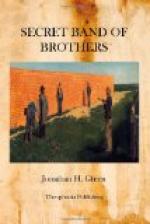among the common brotherhood who had nothing to lose
in point of character, they would employ them, and
if successful, be sure to pocket all the spoils—except
enough to satisfy the immediate wants of their jackals.
If they were not successful, but detected in their
villany, these unfortunate agents could lay claim
to their aid, and were permitted to make drafts of
money to procure bail in case of indictment or to
defray the expenses of a trial. We have sometimes
wondered that certain felons should get clear, when
their guilt has been established beyond a doubt.
We will not wonder when we learn that there are men
of wealth and influence in almost every town, who
are sworn to aid and befriend these villains.
They are sometimes lawyers, and jurors, and even judges.
But their conduct and relations will be more clearly
seen, when I publish their letters and constitution.
It is only necessary to remark in this connection,
that the only persons really benefited in this organized
system of land piracy, are their Grand Masters.
They lay most of the plans, and receive and control
the money,—confer among themselves, but
never with a common brother, only using him as a tool
for the accomplishment of some foul purpose.
Here is policy. It would not be safe to commit
their secrets to the many hundreds under them, but
only to such as are judged suitable after years of
trial, and those beneath are often looking forward
for promotion, which is a pledge of their fidelity.
The reader will perceive that if this higher order
was ever to be fully exposed, it must be by some one
of their own number, for one of an inferior degree
knows no more of their proceedings than the uninitiated.
The danger of a full exposure now threatened them
in connection with Colonel Brown; at least they apprehended
it. They knew they deserved it, and the circumstances
of their accomplice pointed in that direction.
He had the means—their own letters, and
a knowledge of their deeds. It was only necessary
to give information to a third person, and the work
would be done. Besides, he was a man of extensive
acquaintance and influence—a ruling spirit
among his fellows. A revelation from him would
have been direful in the extreme, as, in addition,
he had in his possession the constitution and by-laws
of the fraternity, which were always lodged with the
ruling Grand Master. Under these circumstances
we need not wonder that there was excitement, that
every expedient was employed to rescue the documents
or make away with their possessor. He was now
in confinement. It was vital to their designs
to keep him there till they could secure the letters
and constitution above referred to, or, in case of
failure, make his life pay the forfeit. They cared
but little for his brother, as he was of an inferior
grade. The Grand Masters, then in office, had
but one object in view, and that they were intent
upon accomplishing. The acquittal or conviction
of the two brothers was a matter of no consequence




